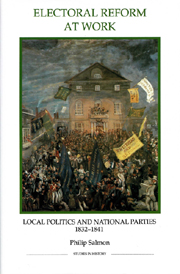Book contents
- Frontmatter
- Contents
- List of illustrations
- List of figures
- List of tables
- Dedication
- Acknowledgements
- Abbreviations
- Introduction
- PART I THE REFORMED ELECTORAL SYSTEM
- PART II THE COUNTIES
- PART III THE BOROUGHS
- 6 No representation without taxation: rates and votes
- 7 The electoral politics of municipal reform
- Conclusion
- Appendices
- Bibliography
- Index
7 - The electoral politics of municipal reform
from PART III - THE BOROUGHS
Published online by Cambridge University Press: 12 September 2012
- Frontmatter
- Contents
- List of illustrations
- List of figures
- List of tables
- Dedication
- Acknowledgements
- Abbreviations
- Introduction
- PART I THE REFORMED ELECTORAL SYSTEM
- PART II THE COUNTIES
- PART III THE BOROUGHS
- 6 No representation without taxation: rates and votes
- 7 The electoral politics of municipal reform
- Conclusion
- Appendices
- Bibliography
- Index
Summary
The Great Reform Act of 1832 continues to hog much of the limelight in accounts of Britain's political development during the nineteenth century and to fuel an ongoing historical debate. The electoral impact of the Municipal Corporations Act of 1835, with its creation of new town councils and annual municipal elections across England and Wales, is by contrast often overlooked. Existing accounts tend to view it either in terms of the political development of local government in rapidly expanding towns, or as a parliamentary postscript to 1832, which reinforced the attack on old political corruption by abolishing the unreformed ‘closed’ corporations. Relatively little comparative work, however, highlighting the structural and technical relationship that existed between the new municipal and parliamentary electoral systems has been done. Indeed, in many ways it seems to have been assumed that the new councils, unlike their notorious unreformed predecessors, had no immediate connection with the parliamentary franchise. In particular, the crucial link between the municipal and parliamentary voter registration process and its merger of constituency and council politics has not received the attention it deserves. This chapter explores the nature of this important interconnection, and emphasises its electoral consequences at both the local and national political level.
The parliamentary background
The electoral impact of municipal reform must be seen within the context of the aims of its sponsors and the fears of its opponents at Westminster. After parliamentary reform, reform of the corporations became a high priority.
- Type
- Chapter
- Information
- Electoral Reform at WorkLocal Politics and National Parties, 1832–1841, pp. 210 - 237Publisher: Boydell & BrewerPrint publication year: 2002



